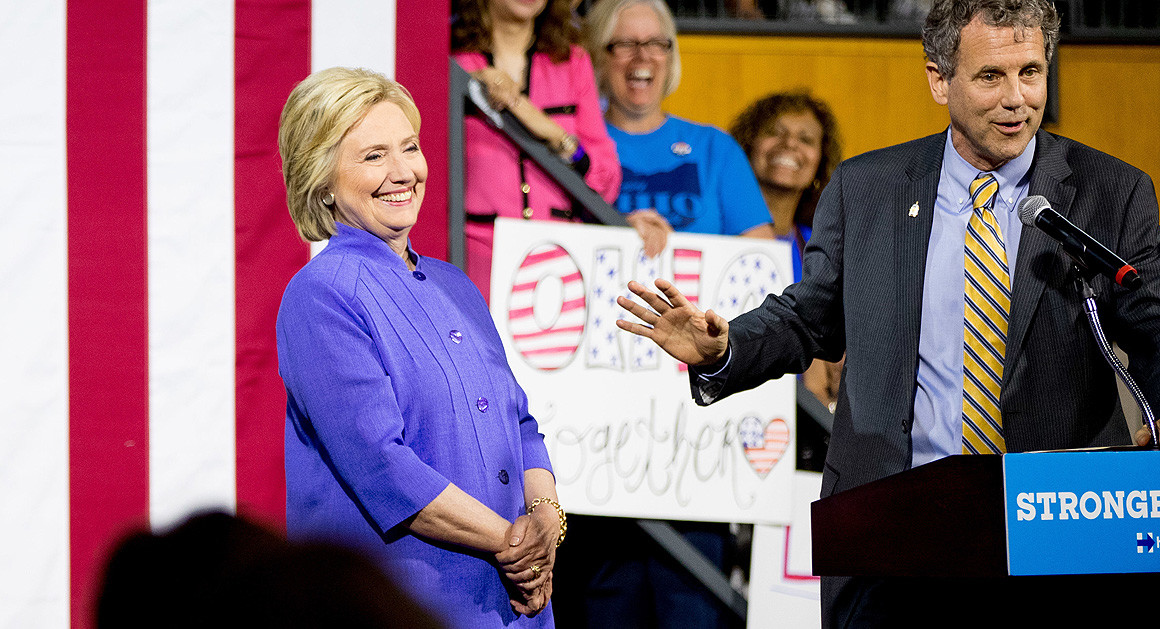
On Day One of the Republican National Convention, Hillary Clinton wasn’t ready to give up the spotlight.
As Donald Trump supporters descended on the Quicken Loans center in Cleveland to celebrate the real estate mogul’s four-day return to reality television, the presumptive Democratic nominee popped up in the same state, just a 3.5-hour drive away, and lit into her rival at the annual NAACP convention in Cincinnati.
“Donald Trump led the movement to delegitimize our first African-American president,” Clinton said, noting that he “plays coy with white supremacists” and “demeans women.”
On the same day Trump’s convention was scheduled to address the question of how to “Make America Safe Again,” Clinton told the audience at the NAACP conference — a group whose invitation to speak Trump declined — that “we have difficult, painful, essential work ahead of us to repair the bonds between our police and our communities, and between and among each other.” Of the violence against police officers that has ripped the country apart over the past two weeks, as well as the latest two incidents of black men killed while in police custody, she said: “This madness has to stop.”
It was Clinton’s first stop of a two-day campaign swing across Ohio and Nevada — two states whose Republican governors (John Kasich and Brian Sandoval, respectively) have notably chosen to sit out Trump’s convention this week. She’s also squeezing in a stop in Minnesota to address a gathering of the American Federation of Teachers.
On Monday, campaigning across Ohio, Clinton showed she was not content to play the traditionally low-key role of the party nominee whose rival is holding his convention. “It is not enough to yell at your TV screen,” she said at an organizing event she attended with Sen. Sherrod Brown, kicking off a nationwide voter registration drive. “It is not enough to send a nasty tweet. That is not enough. You have to get registered and get out to vote in November.”
It’s an unusual convention week strategy in an unusual year. On Monday night, during the prime-time coverage of the convention, for instance, Clinton sat for a rare in-depth interview with Charlie Rose — set to air on CBS just as headliner Melania Trump is taking the stage in Cleveland. Part of Clinton’s determination is driven by a sense, according to Democrats close to the campaign, that Trump won’t lie low next week when the Democrats nominate Clinton in Philadelphia. And part of it is seizing an opportunity in a tight race against a rival who’s a master at garnering free media.
“To have her plans that have been really well thought-out, and well-researched, and her personal experience that comes through in all of this, up against the bullying and the bombast of Trump — that’s of great value to the Clinton campaign,” said Ohio Rep. Tim Ryan of Clinton's NAACP speech. “To have her in the news constantly contrasting with Trump and what they’re representing is a real opportunity to let people who are just starting to pay attention see the contrast.”
On Tuesday, Clinton is set to speak in front of AFSCME in Las Vegas — and the campaign is considering rolling out Clinton’s running mate as early as Friday in Florida to stomp on any momentum Trump gains from a week of wall-to-wall media coverage.
“You can’t serve, but you can return serve,” said Democratic strategist Bob Shrum, who has worked on past presidential campaigns, referring to the constraints on a candidate’s activities while the other side is holding its convention. “But this year is unique.” But he warned against the dangers of averting too much attention from the events in Cleveland, where on Monday chaos broke out on the floor after Republican leaders blocked a recorded roll call vote demanded by the “Never Trump” movement on the convention votes.
“The potential for a train wreck in Cleveland at some point is very high and so you when there’s a train wreck on the other side you don’t want to necessarily get in the way,” said Shrum. “When you have 25 or 30 percent favorables, making the convention all about you may not be the best idea. I think [Trump will] reinforce his negatives.”
Clinton's decision to campaign Monday and Tuesday “reflects the nature of Trump as an opponent,” said Shrum. “She can contrast herself with him in a way in front of the NAACP or the AFT that is powerful."
Democrats close to the campaign said they don’t expect the convention to give Trump the typical bounce because of the focus on him and his family, with few outside surrogates making the case on his behalf.
“I think they will try and make him marginally more acceptable to a larger audience,” said Tom Nides, an outside adviser to the campaign. “I think that’s going to be a hard thing to achieve. He has so many outrageous things that it’s hard to convince people that he has transformed himself at a Republican convention.”
But the campaign isn’t taking any chances, On the ground in Ohio, campaign surrogates include Democratic National Committee Chairwoman Debbie Wasserman Shultz, who will be joined by Sen. Al Franken later in the week. Also spinning in real time against Trump from the convention center will be Ohio Democrats, including former Ohio Ted Strickland and Reps. Marcia Fudge and Joyce Beatty, and economist Austan Goolsbee.
And Correct the Record, the outside rapid response group run by Clinton ally David Brock that coordinates directly with the Clinton campaign, released an online min-documentary on Monday recounting the history of what it called the “politically-motivated, taxpayer-funded Benghazi Committee.” American Bridge, another Brock-led group, was debuting on Monday the Trump Museum, which promised to “highlight his failed business ventures, rampant corporate outsourcing, corrupt business partners and literary ‘accomplishments.’”


